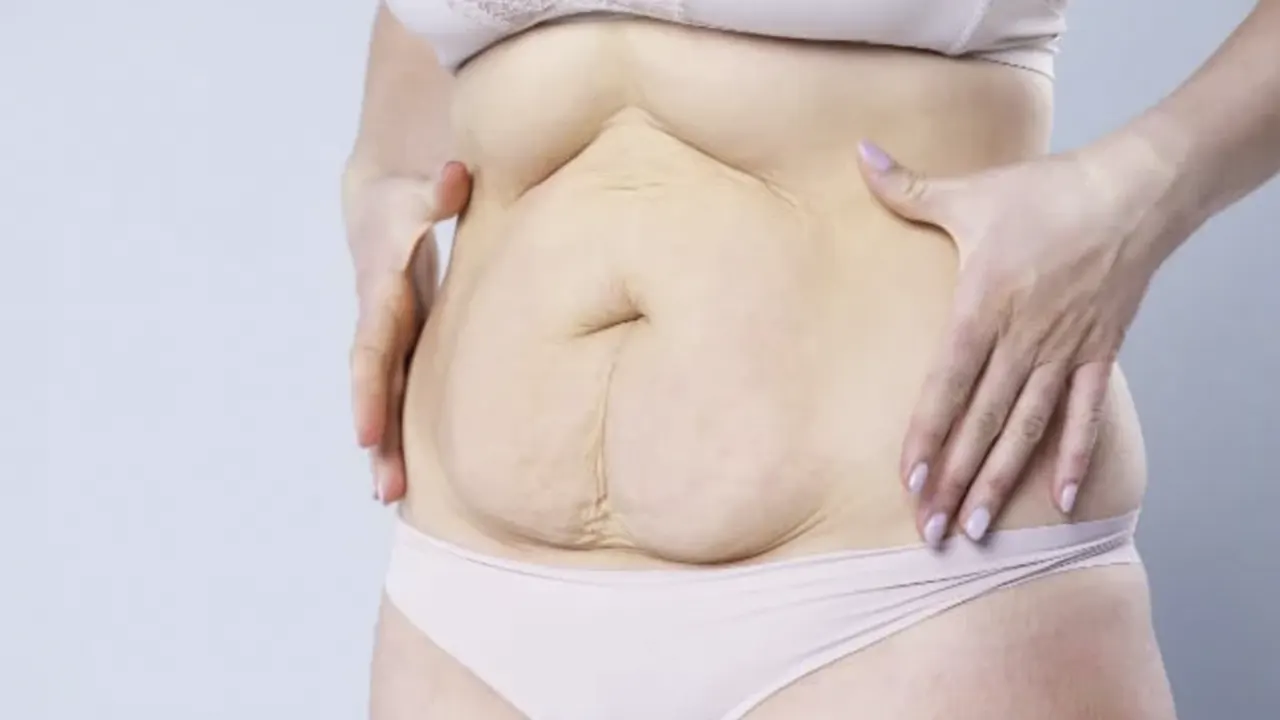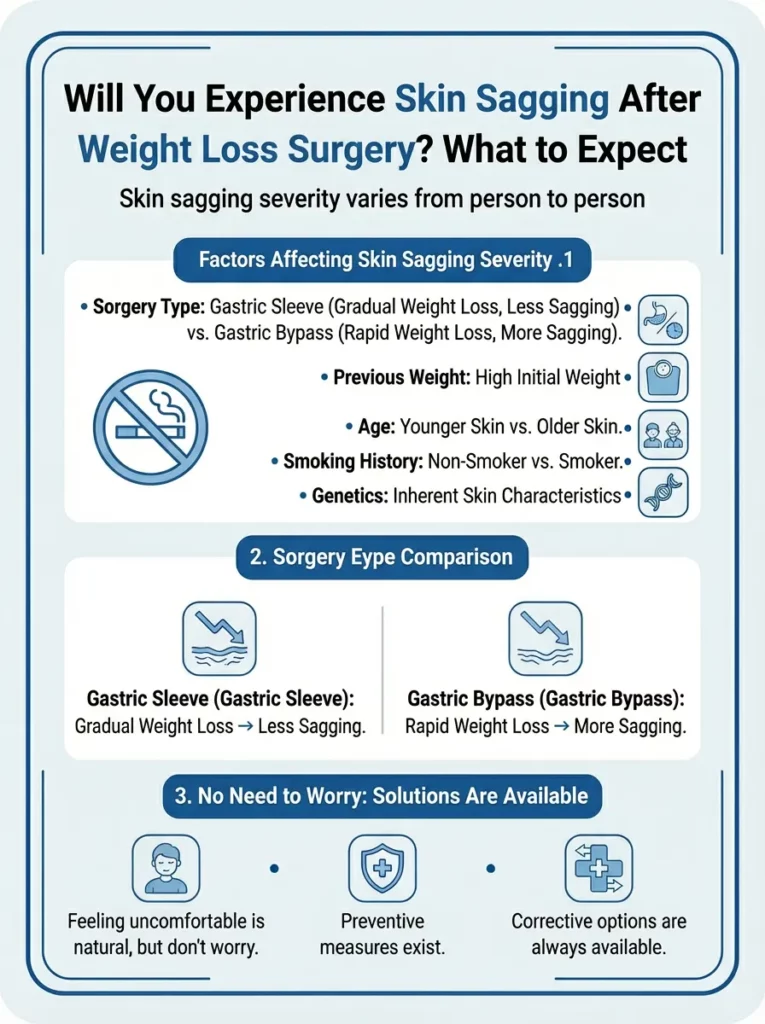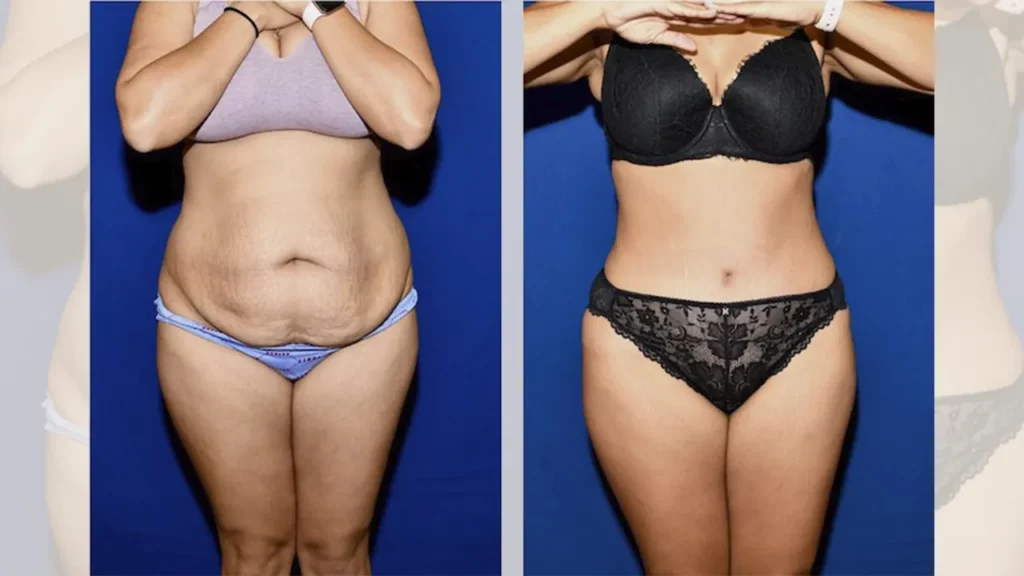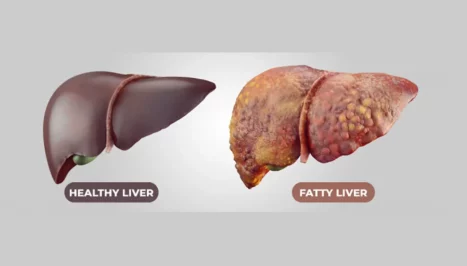What Causes Skin Sagging After Weight Loss Surgery? + 5 Effective Ways to Tighten Your Skin

After weight loss surgery, many patients lose a significant amount of weight—often more than 50 kilograms. While this is a major health achievement, it can also lead to skin sagging after weight loss surgery and weakened muscles. Since this excess skin does not disappear on its own, many patients are left frustrated with loose, hanging skin. This happens because, during weight gain, the skin stretches to cover the expanded fat tissue. However, after weight loss, the skin often lacks the elasticity needed to shrink back to its original shape.
Will You Experience Skin Sagging After Weight Loss Surgery? What to Expect

Now, the question is: to what extent will this issue affect you? The severity of skin sagging after weight loss surgery varies from person to person. It depends on several factors, including the type of surgery, your previous weight, age, smoking history, and genetics.
The type of weight loss surgery plays a major role in how much skin sagging occurs. For example, patients who undergo gastric sleeve surgery, where weight loss happens more gradually compared to gastric bypass surgery, tend to experience less skin sagging. Since most people experience some degree of loose skin after losing weight, it is natural to feel uncomfortable about it. However, there is no need to worry because there are always preventive measures and corrective options available for this issue.
Need consultation?
Contact us for expert advice on weight loss surgeries at the best hospitals in Turkey.
Which Areas of the Body Are Most Affected by Skin Sagging After Weight Loss Surgery?
skin laxity following weight loss surgery most commonly occurs in the abdominal area, which stores the largest amount of fat. However, loose and sagging skin can also happen in other parts of the body. Some people experience sagging and looseness in the arms and chest after rapid weight loss, while others may have sagging in the thighs and buttocks.

How Can You Prevent Skin Sagging After Weight Loss Surgery?
Although loose skin after weight loss is a natural part of the process of losing a large amount of weight, it is possible in some cases to prevent loose and sagging skin by taking certain measures.
Exercise
According to doctors, exercise after weight loss surgery is one of the best ways to prevent skin sagging after weight loss surgery. Although it cannot be guaranteed that patients will avoid any loose or sagging skin during weight loss combined with exercise, physical activity is very effective in reducing abdominal sagging and tightening muscles
.Add strength training and flexibility exercises to your workout routine. Strength training helps shape and tone muscles, while flexibility exercises improve joint mobility and comfort. For better results, it is recommended to include a combination of all these exercises in each session.

Add strength training and flexibility exercises to your workout routine. Strength training helps shape and tone your muscles, while flexibility exercises improve joint mobility and comfort. For better results, it is best to include a combination of all these exercises in each session.
Gradual weight loss
In fact, rapid weight loss is directly related to skin drooping after bariatric surgery. Therefore, try not to lose more than one to two kilograms per week to give your skin enough time to tighten. As mentioned earlier, gastric sleeve surgery causes less skin sagging compared to other types of weight loss surgeries due to its gradual weight loss process.
Skin care
As we age, collagen and elastin naturally lose their strength. For this reason, weight loss at a younger age causes less skin sagging after weight loss surgery because the body has a better ability to return to its previous state. However, the amount of collagen in the skin can also be influenced by genetics.

Taking good care of your skin can increase its resistance to skin sagging after weight loss surgery. Direct sunlight and smoking can negatively affect collagen production in the skin, so it is best to avoid both.
Cosmetic skin surgery
Although following the above steps can be helpful, the reality is that after losing more than 50 kilograms through natural or surgical weight loss methods, some degree of skin sagging after weight loss surgery should be expected.
Cosmetic skin surgery is performed to remove and eliminate excess and loose skin from the body. For example, abdominoplasty (tummy tuck) is one of the most common cosmetic skin surgeries after weight loss surgery. It is natural to be concerned about scars after an abdominoplasty, but a skilled plastic surgeon can place the incisions along the body’s natural curves to make them less visible. There are two main methods to treat abdominal skin drooping after bariatric surgery:
Abdominoplasty
During this surgery, the abdominal muscles and skin are tightened and firmed. Since it is considered a cosmetic procedure, it is usually not covered by insurance.

Panniculectomy
If a patient experiences infection or impaired function in part of the abdomen due to skin sagging or looseness, the surgeon may recommend a panniculectomy. During this surgery, loose and excess skin is removed and tightened, but the muscles are not tightened. Most insurance plans cover panniculectomy surgery.
Who Is a Good Candidate for Cosmetic Skin Surgery?
Those who meet the following criteria can be good candidates for cosmetic skin surgery to treat loose and sagging skin:
- They have reached their weight loss goal and have maintained a stable weight for at least six months. Skin removal surgery provides long-lasting results, but weight fluctuations after surgery can negatively affect the outcome.
- They are in good overall health. (This is important for the patient’s safety.) Certain medical conditions may increase the need for cosmetic skin surgery.
- They have realistic expectations. Removing loose skin can improve appearance but cannot work miracles or completely reshape the body.
- They understand that scars will not disappear entirely, and a skilled surgeon can only minimize their visibility. Therefore, they should keep this in mind when wearing revealing clothing, such as swimsuits.
- They are able to take 2 to 3 weeks off after skin tightening surgery for proper recovery

Also read this: How to Stop Hair Thinning After Bariatric Surgery: 4 Simple Tips
FAQs on Skin Laxity and Excess Skin Following Bariatric Surgery
What are the differences between abdominoplasty and panniculectomy for treating loose skin?
Abdominoplasty tightens both the abdominal muscles and skin and is considered cosmetic surgery, usually not covered by insurance. Panniculectomy removes loose skin but does not tighten muscles and is often covered by insurance, especially when skin issues cause infection or functional problems.
A: The type of surgery influences how quickly you lose weight, which affects skin sagging. For example, gastric sleeve surgery causes more gradual weight loss and usually results in less skin sagging compared to gastric bypass surgery.



